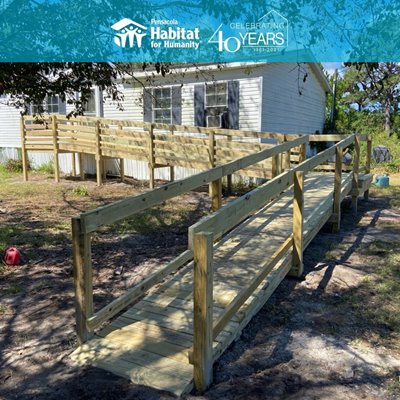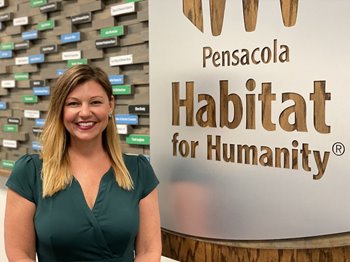Pensacola Habitat for Humanity, a NeighborWorks network organization in Florida, has instituted a new weatherization program. WRAP (Weatherization & Repair Assistance Program) will use funds from Gulf Power to provide subsidized loans for low-income families who need critical home repairs.  The program is one way the organization is helping residents not only find affordable homes, but care for them after purchase. Clients must fall between 30% and 80% area median income. All of the homes in the program are owner-occupied.
The program is one way the organization is helping residents not only find affordable homes, but care for them after purchase. Clients must fall between 30% and 80% area median income. All of the homes in the program are owner-occupied.
Pensacola had been in conversation with Gulf Power for several months to see how they might create a pilot program that could have a strong impact with start-up capital of $100,000. Through WRAP, Pensacola Habitat will provide critical home repairs along with weatherization. "It was an extension of the critical home repair program we already had, but with the addition of caulking, insulation replacement, window repairs – the weatherization things a home needs," says Crystal Scott, vice president of development and communications for Pensacola Habitat. "The goal is to reduce the energy burden for these low-income families."
Scott adds that the organization's Community Development Initiative, which provides critical home repairs, also reduced families' energy burdens. "If you have a hole in your roof, your home isn't going to be energy efficient," she says. October is Energy Awareness Month, a time to discuss energy management and building optimization, energy resilience and security, and using new energy technology to make a difference. NeighborWorks network organizations across the country are doing just that; at least 29 network organizations receive funding from the U.S. Department of Energy's Weatherization Fund.
repairs, also reduced families' energy burdens. "If you have a hole in your roof, your home isn't going to be energy efficient," she says. October is Energy Awareness Month, a time to discuss energy management and building optimization, energy resilience and security, and using new energy technology to make a difference. NeighborWorks network organizations across the country are doing just that; at least 29 network organizations receive funding from the U.S. Department of Energy's Weatherization Fund.
Clients who will be served by WRAP often don't have much expendable income, Scott shares. At the same time, Pensacola Habitat needed a model that was sustainable. Through WRAP, clients will pay back 60% of the total project cost over five years with no interest. The other 40% will be given to the family as a grant. "We're not getting all of the funds back, but at least we're getting some to keep the program going." Meanwhile, families should save money on their power bills.
Olivia, a homeowner in Pensacola, is part of the new program. She recently wrote to staff to express her gratitude. "We were without AC and heat for over a year and a half," she wrote. "With my finances, I have been unable to pay for the repairs my home needed. My family and I are so relieved to finally have the luxury of having the AC back!" Olivia says she knows that the repairs her home will be getting will also help with her electric bill.
In Florida, air conditioning is more than a luxury. While temperatures often reach the 90s in the summer, "it's the humidity factor that plays in," says Wes Hudgens, senior community relations specialist for Gulf Power. "That can take a 95-degree day and turn it into a 110-degree day." Summertime is often when people use the most energy, but that can vary if there's a harsh winter.
"Our overall goal is to help our clients utilize our services as efficiently as possible," Hudgens says. "We regularly highlight the programs we have in place so they're aware of how to do just that." And they help create new ones, like the program with Pensacola Habitat.
"We've got a great relationship," Hudgens says. "We approached them with this idea of how to reach clients who are in need." When Habitat recommended WRAP, "it just made sense. Their clients are our customers. We thought it was a way to reach clients to make necessary improvements in their homes that would reduce energy consumption."
They'll know the program is successful when clients see gains in energy efficiency, he says. Gulf Power also offers tips on small things people can do to reduce utility bills: Make sure doors and windows have caulking or weather strips; ensure roofs and attics have proper insulation; remember to turn off lights in unoccupied rooms; use the reverse setting on a ceiling fan during colder weather to push hot air down.
Scott says most of the loans will be between $5,000 and $10,000. Some repairs will be completed by staff and some may require outside contractors. Meanwhile, staff members will also engage clients in a home-maintenance refresher course, discussing simple techniques that will also reduce the energy burden. Tips include using LED lighting and regularly changing air filters. Pensacola Habitat offers both to program participants.
Pensacola Habitat and Gulf Power had a long-term partnership before the new program. "When we talked about their goals and our goals, they lined up," Scott says. "They had folks who had just a major energy burden. These folks were having to make a decision between paying their power bill and paying their mortgage. We don't want anyone to ever have to make those impossible decisions."
Scott believes their model could be replicated in other areas. While in Florida, one of the main issues is around the hot summers, areas with cold winters could also find partnerships with local power companies.
Pensacola Habitat, with its focus on Northwest Florida, is currently celebrating its 40th anniversary. "Things now look completely different than they did during 1981," Scott says. "We've built over 1,400 homes and provided affordable homeownership to that many families here." But some things are the same. "We are all committed to our mission of building homes, communities and hope. We're committed to meeting needs and figuring out how to serve."
10/01/2021

